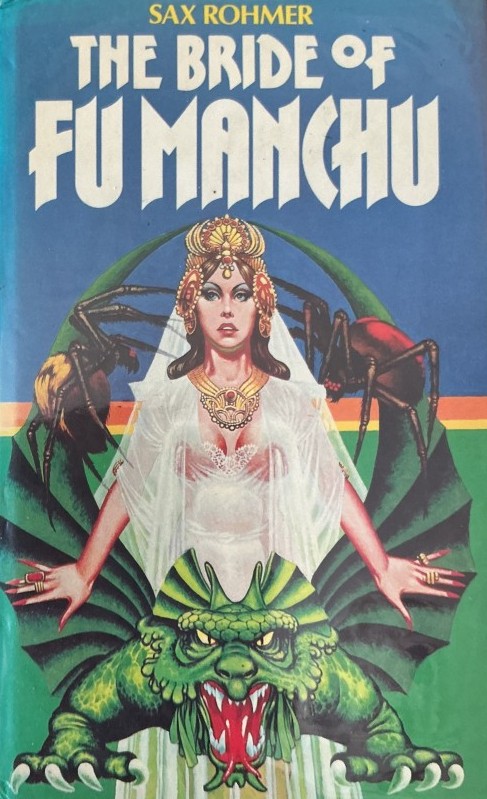Inspiring Older Readers
 posted on 16 Sep 2025
posted on 16 Sep 2025
The Bride of Fu Manchu by Sax Rohmer
From the age of about 8 or 9 my Saturday late mornings were dominated by trips to one of the two local cinemas that I could walk to in minutes – The Triangle and The Luxor. Mostly these showed programmes that were a mix of cartoons, adventure serials that specialised in cliff-hanger endings and documentary or news reels. Cost of entry was literally pocket-money sized – leaving room for the obligatory large bag of assorted sweets.
Later in the evenings there would be feature films and for these I needed a parent to come with me until I got to secondary school age and was deemed old enough to go on my own. I recall seeing ‘The Guns of Navarone’, ‘Zulu’ and (to keep my mother company) ‘Seven Brides for Seven Brothers’ but my greatest desire was always to see something that I found magnetically alluring – Christopher Lee playing the fiendishly evil Chinese villain, Fu Manchu. The posters for this series of films were irresistible – lurid colours, impossibly glamorous women in perils of one kind or another and, of course, the Machiavellian Fu Manchu himself looming over it all.
Over the years following these 1960s thrills, I came to think of my love for the films as a youngster’s folly – they were, after all, dreadful melodramas packed with racism, sexism and a sort of general orientalism that painted all Chinese as inscrutable, potentially villainous or absurdly comic.
So much then for Fu Manchu until not so long ago when I came across a short article that referenced the Sax Rohmer book series of the original literary incarnation of Fu Manchu. Just who, I thought, was this Sax Rohmer? Well, to my huge surprise it seems that in an odd way Fu Manchu had found his way home when the fat boy in Birmingham’s Balsall Heath rushed to his cinema seat in 1960s to watch his adventures because this is what Wikipedia has to tell me about Sax Rohmer (real name Arthur Ward:
“Born in Birmingham to working class Irish parents William Ward (c. 1850–1932), a clerk, and Margaret Mary (née Furey; c. 1850–1901), Arthur Ward initially pursued a career as a civil servant before concentrating on writing full-time. He worked as a poet, songwriter and comedy sketch writer for music hall performers before creating the Sax Rohmer persona and pursuing a career writing fiction.”
Rohmer (1883 – 1959) wrote 13 Fu Manchu novels in two bursts – an initial three between 1913 – 1917 and then a further 10 from 1931 – 1959 and they were hugely successful despite the fact that they stereotyped the Chinese community so appallingly (and, not surprisingly, drew official criticism from the Chinese Government and various representatives of Chinese communities in the U.S.).
Then - and this is the serendipity of book hunting – I walked into a shop and found the 1977 British reprint of the 1949 original of The Bride of Fu Manchu in completely pristine condition. So, I had to buy it to see whether a Sax Rohmer novel could exercise the same allure as the 60s movies.
Well, it couldn’t of course: I guess it was never going to. I’m not going to waste a lot of time on the completely barmy plot which revolves around Fu Manchu’s plan to release engineered hybrid plague-carrying flies in order to bring about the collapse of world governments – paving the way for his own world domination (I told you it was barmy). Rohmer uses a cast of characters that would be familiar to anyone reading others in the series – Dr Petrie, Sir Denis Nyland Smith (Fu Manchu’s sworn nemesis) and Fu Manchu’s hauntingly glamorous but ultimately deadly daughter. He introduces an especially stupid new narrator, Dr Alan Sterling who finds himself entranced beyond reason by a waif-like young girl, Fleurette, who leads him into all sorts of danger.
It's almost the definition of a pulp thriller and as such is well enough done – it rattles along and as long as you don’t engage your brain the action whizzes past as you find yourself turning page after page.
All the criticism the series has had about the colonial attitudes on display and the cultural catastrophe that passes as characterisation of the Chinese are totally justified but I think it’s important to remember that these are essentially adult comic book stories and there’s no real attempt to draw anything Eastern (or Western for that matter) that has any bearing on reality.
But if racial and gender stereotypes offend you, stay away: actually if you’re looking for literature, stay away too. This is essentially an entertainment for your brain’s downtime.
These reprints of the Fu Manchu stories in both hard and paperback aren’t hard or expensive to find if, like me, you’re the tiniest bit intrigued and want to dip you toes in the pulp pond.
Terry Potter
September 2025